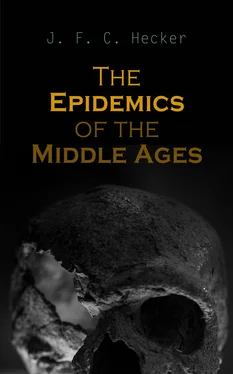J. F. C. Hecker
The Epidemics of the Middle Ages
The Black Death, The Dancing Mania & The Sweating Sickness
Translator: B. G. Babington
e-artnow, 2020
Contact: info@e-artnow.org
EAN 4064066386252
General Preface.
Address to the Physicians of Germany.
The Black Death.
Translator’s Preface.
Preface.
Chapter I. General Observations.
Chapter II. The Disease.
Chapter III. Causes.—Spread.
Chapter IV. Mortality.
Chapter V. Moral Effects.
Chapter VI. Physicians.
Appendix.
I.
II.
The Dancing Mania.
Translator’s Preface.
Preface.
Chapter I. The Dancing Mania in Germany and The Netherlands.
Chapter II. Dancing Mania in Italy.
Chapter III. Dancing Mania in Abyssinia.
Chapter IV. Sympathy.
Appendix.
I.
II.
III.
IV.
V.
VI.
The Sweating Sickness.
Preface.
Chapter I. The First Visitation of the Disease—1485.
Chapter II. The Second Visitation of the Disease.—1506.
Chapter III. The Third Visitation of the Disease.—1517.
Chapter IV. The Fourth Visitation of the Disease.—1528, 1529.
Chapter V. Fifth Visitation of the Disease.—1551.
Chapter VI. Sweating Sicknesses.
Appendix.
Table of Contents
The Council of the Sydenham Society having deemed Hecker’s three treatises on different Epidemics occurring in the Middle Ages worthy of being collected into a volume, and laid before its members in an English dress, I have felt much pleasure in presenting them with the copyright of the Black Death; in negociating for them, the purchase of that of the Dancing Mania, whereof I could resign only my share of a joint interest; and, in preparing for the press these productions, together with a translation, now for the first time made public, of the Sweating Sickness. This last work, from its greater length, and from the immediate relation of its chief subject to our own country, may be considered the most interesting and important of the series.
Professor Hecker is generally acknowledged to be the most learned medical historian, and one of the most able medical writers in Germany. His numerous works suffice to show not only with what zeal he has laboured, but also how highly his labours have been appreciated by his countrymen; and when I state that, with one trifling exception, they have all been translated into other languages, I furnish a fair proof of the estimation in which they are held in foreign countries; and, so far at least as regards the originals, a full justification of the Council of the Sydenham Society in their choice on the present occasion.
The “Schwarze Tod,” or “Black Death,” was published in 1832; and I was prompted to undertake its translation, from a belief that it would prove interesting at a moment when another fearful epidemic, the Cholera, with which it admitted of comparison in several particulars, was fresh in the memory of men. The “Tanzwuth,” or “Dancing Mania,” came out shortly afterwards; and, as it appeared to me that, though relating to a less terrific visitation, it possessed an equal share of interest, and, holding a kind of middle place between a physical and a moral pestilence, furnished subject of contemplation for the general as well as the professional reader, I determined on adding it also to our common stock of medical literature. When the “Englische Schweiss,” or “Sweating Sickness,” which contained much collateral matter little known in England, and which completed the history of the principal epidemics of the middle ages, appeared in 1834, I proceeded to finish my task; but failing in the accomplishment of certain arrangements connected with its publication, I laid aside my translation for the time under a hope, which has at length been fulfilled, that at some future more auspicious moment, it might yet see the light.
It must not be supposed that the author, in thus taking up the history of three of the most important epidemics of the middle ages, although he has illustrated them by less detailed notices of several others, considers that he has exhausted his subject; on the contrary, it is his belief, that, in order to come at the secret springs of these general morbific influences, a most minute as well as a most extended survey of them, such as can be made only by the united efforts of many, is required. He would seem to aim at collecting together such a number of facts from the medical history of all countries and of all ages, as may at length enable us to deal with epidemics in the same way as Louis has dealt with individual diseases; and thus by a numerical arrangement of data, together with a just consideration of their relative value, to arrive at the discovery of general laws. The present work, therefore, is but one stone of an edifice, for the construction of which he invites medical men in all parts of the world to furnish materials 1.
Whether the information which could be collected even by the most diligent and extensive research would prove sufficiently copious and accurate to enable us to pursue this method with complete success, may be a matter of doubt; but it is at least probable, that many valuable facts, now buried in oblivion, would thus be brought to light; and the incidental results, as often occurs in the pursuit of science, might prove as serviceable as those which were the direct object of discovery. Of what immense importance, for instance, in the fourteenth century, would a general knowledge have been of the simple but universal circumstance, that in all severe epidemics, from the time of Thucydides 2to the present day, a false suspicion has been entertained by the vulgar, that the springs or provisions have been poisoned, or the air infected by some supposed enemies to the common weal. How many thousands of innocent lives would thus have been spared, which were barbarously sacrificed under this absurd notion?
Whether Hecker’s call for aid in his undertaking has, in any instance, been answered by the physicians of Germany, I know not; but he will be as much pleased to learn, as I am to inform him, that it was the perusal of the “Black Death” which suggested to Dr. Simpson of Edinburgh the idea of collecting materials for a history of the Leprosy, as it existed in Great Britain during the middle ages; and that this author’s very learned and interesting antiquarian researches on that subject, as published in the Edinburgh Medical and Surgical Journal, have been the valuable, and, I trust, will not prove the solitary result.
As the three treatises, now comprised for the first time under the title of “The Epidemics of the Middle Ages,” came out at different periods, I have thought it best to prefix to each the original preface of the author; and to the two which have already been published in English, that of the translator also; while Hecker’s Address to the Physicians of Germany, although written before the publication of the “Englische Schweiss,” forms an appropriate substitute for an author’s general preface to the whole volume.
At the end of the “Black Death,” I had originally given, as No. III. of the Appendix, some copious extracts from Caius’ “Boke or Counseill against the Disease commonly called the Sweate or Sweatyng Sicknesse;” but this little treatise is so characteristic of the times in which it was written, so curious, so short, and so very scarce 3, that I have thought it worth while, with the permission of the council of our Society, to reprint it entire, and to add it in its more appropriate place, as an Appendix to the Sweating Sickness.
Читать дальше










